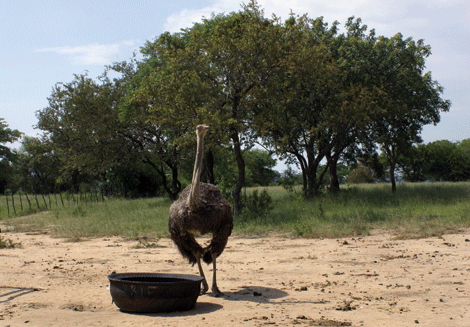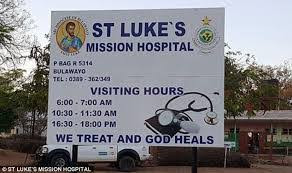
THE Maleme Ranch debacle that has been at the centre of controversy over the past months presents an interesting scenario that exposes the machinations of Zanu PF and the role of the State security personnel in electoral fraud in the July 31 2013 general elections as well as the Matabeleland destruction agenda.
As a villager, I would like to unravel the untold stories that are talk in the shadows, as an effort to put everyone interested in the Maleme saga into perspective so that the analysis and subsequent strategy towards resolving the crisis can be informed by our local community narrative.
Rodney Mashingaidze is said to have been awarded Maleme Ranch as a “thank you” token for having enabled Zanu PF to win both constituencies in the district by our very own sons of Matabeleland.
The methodology used by the security personnel to win the election for the party remains mere guess work. However, that the security personnel played a key role is a naked and bare fact based on the circumstances surrounding the Maleme saga.
Since violence was not recorded, the suspicions of rigging are, therefore, justified, judging from the patterns of the results of that election.
May I hasten to highlight that the confusion around the land reform process created opportunities and conditions conducive for electoral fraud. Zanu PF is not committed to the setting up of the land commission to expose multiple ownership of farms.
The government cannot account as to how many people have been resettled, who those people are and where they are. That confusion creates good ground for vote-rigging.
The Fox and Bookless farm invasion, as an example, saw over 350 families registering their children and/or relatives, with a group of war veterans masquerading as the land committee, who would then submit them to the “lands committee” in Kezi.
- Chamisa under fire over US$120K donation
- Mavhunga puts DeMbare into Chibuku quarterfinals
- Pension funds bet on Cabora Bassa oilfields
- Councils defy govt fire tender directive
Keep Reading
This may have easily created the necessary data base for the rigging machinery, with the registration slips phenomenon at play, possibly masterminded by Mashingaidze.
The second take to it is that he could have been the conduit through which State funds were used to campaign for the ruling party and could have been the chief strategist in the campaign towards the Zanu PF victory in Matobo and Matabeleland South.
Sources say that there was a meeting to deliberate on the way forward after elections and Mashingaidze was part of it. It is believed that the meetings agreed that since Mashingaidze was a Central Intelligence Organisation (CIO) operative, he should be the one taking Maleme Ranch because they were likely to face resistance, but people would fear the CIO operative while others targeted easier farms.
Clever Dube, who represents both Zanu PF and war veterans in the district lands committee and is the most influential was going to arrange a lands committee meeting and in that meeting exclude Chief Malaki Masuku, under whose jurisdictions the contested farms fall.
They opted for another chief to kind of follow the procedure (name withheld for strategic reasons).
The next stage was to armtwist the Matabeleland South Residential Affairs minister Abednico Ncube into influencing the provincial lands committee to grant the farms to Mashingaidze and his colleagues.
Ncube, who at that time was facing the boot as he was linked to the gamatox faction led by ousted Vice-President Joice Mujuru, had no option but to comply to save himself from the tsunami and gain prosecution.
Mashingaidze’s offer letter is dated December 4 2014, around the Zanu PF congress period.
Why Maleme Ranch? David Cunningham, the owner of Maleme Ranch, is white and the strategy of the party is to remove all whites as confirmed by the President Robert Mugabe’s recent remarks.
Maleme has been at the epicentre of the community development initiatives in the surrounding wards where people have been doing various agro projects and most of them did not vote for Zanu PF.
Ward 16 voted for an MDC-T councillor while ward 17 voted for an MDC councillor. The question is how did the MP win? Numerically speaking, the above wards are the most populous wards in the constituency save for ward 25 where there is Fox Farm.
From the political strategic perspective, the Cunninghams are bad people who have economically empowered these wards to the extent that they can make their political choices without fear of being denied food aid. The people in these wards cannot be patronised.
The operation to target the farm is rather politically driven more than Mashingaidze’s need for a farm. The idea is to systematically undermine the people’s economic activities, make them poorer and susceptible to political manipulation, a strategy that would be seen as punishment for the surrounding communities and a lesson for the future so that they would vote for Zanu PF.
I doubt the sincerity of his desire for a farm for agricultural purposes. There are several farms that are vacant in the district, some that were gazetted, but Zanu PF prioritised Maleme and other productive farms that are contributing immensely to the economic development of the region (in 2003 Shalom was the biggest ostrich farm in Africa).
The project is adopting the Israeli technology of farming and the produce from the local farmers in Matabeleland was going to be bought by Cunningham for processing.
In August 2013, he purchased a state-of-the-art tomato processing plant, creating jobs in Bulawayo for not less than 60 people per shift.
The Turning Matabeleland Green Project would, therefore, work against the ideals of the Zanu PF 1979 Grand Plan, a very evil tribal strategy, by unlocking the economic potential of the region.
If the project is allowed to succeed, Matabeleland would be an independent economic giant and those in power felt threatened.
Most productive farms in Matabeleland South are being parcelled out to senior civil servants, government officials and children of top politicians at the expense of local people.
The takeover is not influenced by the desire to redistribute the land; if that was the case, the first priority beneficiaries would have been the locals of the particular areas in line with the indigenisation policy.
My opinion is that the Maleme Farm grab is influenced by the tribal hegemony and aided by Matabeleland’s own traitors who have lost morals and are ready to kill their own brothers and sisters to appease the new masters.
The crime of the Cunninghams is not only being white in a racially intolerant Zanu PF system, but that of being a white with passion for the development of Matabeleland. The same system tolerates some whites in other regions.
Some of them are even councillors representing and funding Zanu PF.
Cunningham and his crew should have known that it is taboo to initiate transformative development projects in Matabeleland. He should have consulted the late Vice-President Joshua Nkomo before engaging in development projects, or should have partnered with some of the powerful Zanu PF officials.
The other crime of the Cunninghams is that they have been too professional in doing business; they remain apolitical and clean. Zanu PF wants people who are dirty like them. Cunningham should have known that paying “farm protection fees” to Zanu PF bigwigs helps.
The battle to save Maleme Ranch and others should be a political action by the natives — non-violent protests, civil disobedience and political engagements.
We must learn the lessons from the anti apartheid revolution in South Africa. I am not insinuating tribal war, but I am proposing a civic revolt, not against a constitutionally elected government, but against elements within the government that are manipulating systems to further their selfish interests and hide their criminal activity.










